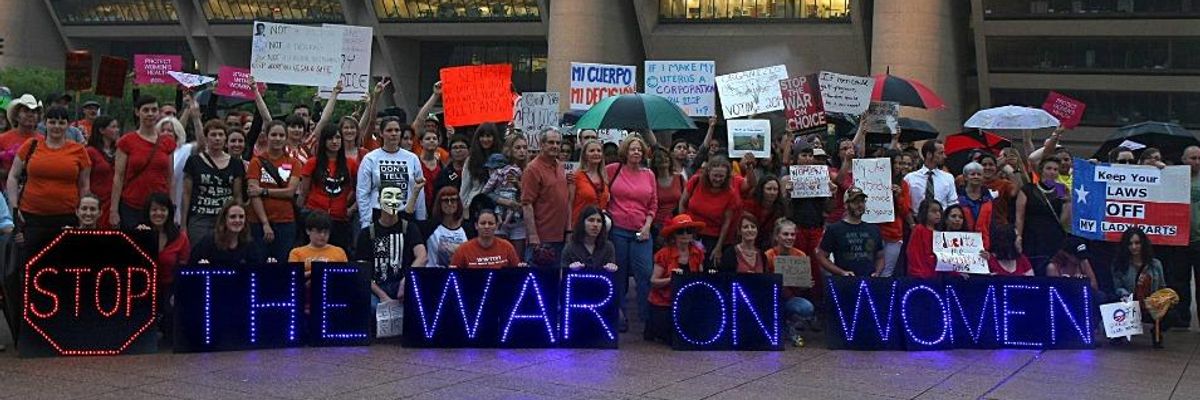With all but eight abortion providers in the state of Texas shuttered, women's health facilities on Monday evening asked the U.S. Supreme Court to block parts of a restrictive state law that severely limits access to abortion, in order to "put an end to the irreparable and unjustifiable harm to Texas women that is happening right now."
The 55-page emergency application came in response to last week's ruling by the U.S. Court of Appeals for the 5th Circuit, which allowed Texas to implement a law that requires abortion clinics to upgrade to the capacity of a hospital-like surgery center and requires abortion doctors to have patient-admitting privileges at a nearby hospital.
Women's health advocates say the appellate court employed a "demonstrably wrong application of the undue burden standard" by which constitutionality is judged, and that enforcement of the law should be put on hold until the legal battle is over. The plaintiffs are currently awaiting a decision on whether the full appeals court will rehear the case.
The Fifth Circuit Court's decision led to the immediate closure of more than a dozen clinics in the state and, according to the Center for Reproductive Rights, left "nearly one million Texas women facing a minimum of a 300 mile roundtrip to access their constitutional right to an abortion."
"There can be no question that just a handful of clinics left to offer safe, legal abortion care to all women across the vast state of Texas is a dire emergency in need of an immediate response," said Nancy Northrup, president and CEO of the Center for Reproductive Rights (CRR), which is representing the health care facilities. "Every hour that these clinics are closed adds to the number of women, many facing urgent circumstances, who will be denied essential care and their constitutional rights. Every day that passes increases the likelihood that these shuttered clinics will never be able to open again."
Justice Antonin Scalia, with whom the petition was filed, reportedly called for a response to the CRR petition from state officials by noon on Thursday. He could act on the request unilaterally or pass it along to the full Court.
Politico reports that the Texas application "could be just the first of several abortion-related cases to reach the court in the upcoming term." The nine Supreme Court justices could choose to weigh in on this case--though last year, when asked to block other parts of the Texas statute, they refused--or on other cases having to do with nonsurgical abortion and ambulatory surgery center standards.
While the Court has only tackled a few abortion issues in the last decade, it's possible the time has come. The provisions in the Texas law are just a few of many recent attempts to restrict abortion access by imposing strict regulations on providers.
"This issue is crying out for Supreme Court resolution," Jennifer Dalven, director of the Reproductive Rights Freedom project at the ACLU, toldPolitico. Allowing the Texas law and other states' laws to proceed "means that for many, many women, the constitutional right to an abortion is just not a right anymore."
And the harms inflicted by enforcement of the Texas law are far from speculative.
"After just a few days, we have already begun to see the real impact of these onerous and medically unnecessary restrictions," said Amy Hagstrom Miller, CEO of Whole Woman's Health, a San Antonio-based facility that is among those challenging the Fifth Circuit's decision. "We are being forced to turn women away from safe, compassionate health care simply because of our politicians' ideological agenda."

